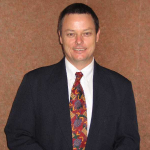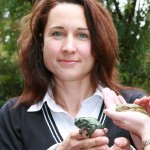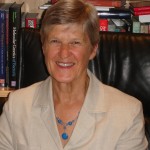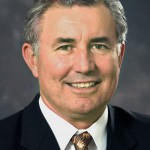Short profiles of the forum speakers
Nigel Perkins
Ron Glanville
Karrie Rose
Peter Collignon
Moira McKinnon
Martyn Jeggo
Mark Burgman
Lyn Gilbert
Stephen Prowse
Tom Aldred
John Edwards
Peter Daszak
Julie Hall
Nigel Perkins
AusVet/Australian Biosecurity CRC
Nigel is a veterinary epidemiologist with experience in investigations of animal health and disease in livestock, aquatic species and wildlife. Nigel has worked in Australia, USA and New Zealand and has been involved in a number of projects in Asia associated with biosecurity capacity building and disease outbreak investigations.
He is the author of numerous scientific articles, a multi-award winning teacher and has extensive experience in post-graduate training in epidemiology.
Nigel is a director of AusVet Animal Health Services, surveillance program co-ordinator for the Australian Biosecurity Cooperative Research Centre and program manager for the Horse R&D Program within the Rural Industries Research and Development Corporation.
Ron Glanville
Biosecurity Queensland
Dr Ron Glanville has 30 years experience in leading and implementing biosecurity programs in Queensland. In his current position of Chief Biosecurity Officer and Chief Veterinary Officer within Biosecurity Queensland, Ron is responsible for leading and managing biosecurity policy and operations for the State across a range of sectors.
Major achievements through his career include key roles in: finalisation of brucellosis and tuberculosis eradication in Queensland; management of a number of animal disease emergency responses; guiding change in the way endemic diseases are managed in Queensland; implementing a number of national disease surveillance and prevention programs; and overseeing significant regulatory reform.
In recent times, Ron has guided implementation of the National Livestock Identification System in Queensland and led the eradication of equine influenza for the state.
Karrie Rose
Taronga Conservation Society Australia
Karrie became interested in working with wildlife while conducting field research and population studies with Ferruginous Hawks and Burrowing Owls during university. Further summer employment within the wildlife rehabilitation and pathology programs at Calgary Zoo cemented her commitment to the study of wildlife health.
Shortly after graduating with the faculty gold medal from the Western College of Veterinary Medicine, in Saskatoon, Karrie pursued a 3 year residency at the Metropolitan Toronto Zoo. This residency was completed in conjunction with a Doctor of Veterinary Science Degree in Zoo and Wild Animal Medicine and Pathology at the Ontario Veterinary College. Completion of this degree lead to 16 months employment in New Zealand as the manager of a charitable wildlife rehabilitation organisation that was contracted by the Maritime Safety Authority of New Zealand.
Karrie moved to Sydney in 1998 to take up a position of Veterinary Pathologist for the Zoological Parks Board of NSW. She now provides a diagnostic pathology service for Taronga and Western Plains Zoo’s, as well as overseeing the Australian Registry of Wildlife Health.
Karrie was on the steering group for the establishment of the Australian Wildlife Health Network, has written many published papers on wildlife, wildlife disease and wildlife pathology, and has published the highly regarded Wildlife Investigation Manual.
Peter Collignon
The Canberra Hospital and Australian National University.
Dr Collignon is Director of Microbiology and the Infectious Diseases Unit at The Canberra Hospital. He also has clinical appointments at all the other hospitals in Canberra (Calvary Hospital, John James Hospital and The National Capital Private Hospital). He is a Professor in the School of Clinical Medicine of the Australian National University. In 2001 he spent 5 months working at World Health Organisation (WHO) headquarters in Geneva on a project related to the overuse of antibiotics in food animals. He has been an active member of many national and international committees on the use of antibiotics in food animals and infection control.
As well as the clinical care of patients, he is involved in teaching and research. He has published many articles in both Australian and international medical and scientific journals.
His main research interests involve antibiotic resistance in S. aureus, E.coli, pneumococcus and P. acnes. He is also very active in infection control and issues with hospital-acquired infections, especially blood stream infections associated with intravascular catheters. He has been involved in many research projects looking at current practices in medicine and how these may be improved to decrease the risk of patients acquiring infections. Another major area of interest is the issue the development and spread of resistant bacteria through the use of antibiotics in food animals.
Moira McKinnon
Moira McKinnon is a public health physician who has worked in the north of Australia and in northern Canada developing public health programs and surveillance systems. Moira worked for five years as the main advisor in communicable diseases for the Australian Department of Health and Ageing. In that role she chaired the National Arbovirus and Malaria Advisory Committee. Moira now provides public health input into the Australian Biosecurity Cooperative Research Centre, Australian Capital Territory Health and currently working on Emerging Infectious Disease projects in South East Asia.
Martyn Jeggo
Australian Animal Health Laboratory

Dr Jeggo is a veterinarian with specialist qualifications in tropical veterinary science and a PhD in virology. After qualifying and spending a short period in general veterinary practice, he worked in the Yemen Arab Republic as Director of the Veterinary Diagnostic Laboratories, before returning to the UK to work at the Institute of Animal Health, Pirbright Laboratories.
In 1996 Dr Jeggo joined the UN visiting more than 150 national veterinary laboratories in Africa, America and Asia and working on a range of tropical diseases including foot and mouth disease, rinderpest and contagious bovine pleuro-pneumonia.
In 2002 he became head of the CSIRO Australian Animal Health Laboratory in Geelong, Victoria.
Mark Burgman
Australian Centre of Excellence for Risk Analysis
Mark Burgman is Director of the Australian Centre of Excellence for Risk Analysis and the Adrienne Clarke Chair of Botany in the School of Botany at the University of Melbourne. He works on ecological modelling, conservation biology and risk assessment.
He received a BSc from the University of New South Wales (1974), an MSc from Macquarie University, Sydney (1981), and a PhD from the State University of New York (1987).
He worked as a consultant ecologist and research scientist in Australia, the United States and Switzerland during the 1980s before joining the University of Melbourne in 1990.
He has published four authored books, two edited books, over 140 research papers, and more than 50 reviewed reports and commentaries. His most recent book ‘Risks and decisions for conservation and environmental management’ was published by Cambridge University Press in 2005.
Lyn Gilbert
Institute of Clinical Pathology and Medical Research, Westmead Hospital
Professor Lyn Gilbert is an infectious diseases physician and clinical microbiologist and Director of the Centre for Infectious Diseases & Microbiology (CIDM), ICPMR, Westmead Hospital, one of the largest diagnostic and public health microbiology laboratories in Australia.
CIDM is a member of the Public Health Laboratory Network and the US Center for Disease Control’s Laboratory Response Network and includes the NSW Emerging Infections and Biohazard Response Unit (EIBRU).
The EIBRU is housed in a new high security PC4 laboratory and is responsible for, among other things, investigation of suspicious substances and possible bioterrorism incidents, in conjunction with the NSW Police Forensic Unit.
Stephen Prowse, Australian Biosecurity CRC
Professor Stephen Prowse is the CEO of the Australian Biosecurity CRC and an Adjunct Professor in the Faculty of Biological and Chemical Sciences at the University of Queensland. Stephen has a background in disease research in humans and livestock with a focus on pathogenesis, and the development of vaccines and diagnostics.
Prior to his current appointment he was the Manager for Strategy and Evaluation in the CSIRO Division of Livestock Industries, where he had responsibility for leading the development and implementation of scientific strategy, and for the evaluation of the programs and projects. In 2001, Stephen was Acting Director of the CSIRO Australian Animal Health Laboratory, Australia’s primary emergency animal disease diagnosis laboratory.
Professor Prowse is the author of over 100 publications in refereed journals, books, industry journals and on-line. He is also a reviewer for various journals and funding organisations and serves on various government and industry advisory and policy committees.
Tom Aldred
Department of Agriculture, Fisheries and Forestry
Tom was appointed as the Executive Manager of the Product Integrity, Animal and Plant Health Division within the Australian Government Department of Agriculture, Fisheries and Forestry (DAFF) in late 2007.
Tom has been a Senior Executive in DAFF for eight years, including in the Natural Resource Management (NRM) policy taskforce that designed the National Action Plan for Salinity & Water Quality and recently as Executive Manager of the NRM Division.
He has also managed the rural support and adjustment area of DAFF, including the Agriculture – Advancing Australia package. Tom has been a Liaison Officer in offices of the Minister for Agriculture, Fisheries and Forestry and worked on secondment with Land & Water Australia, one of the rural Research and Development Corporations.
John Edwards
Murdoch University/Australian Biosecurity CRC
Professor John Edwards is Dean of the School of Veterinary and Biomedical Sciences at Murdoch University and is a former Chief Veterinary Officer for WA.
He worked for the World Organisation for Animal Health as Regional Coordinator for the OIE Southeast Asia Foot and Mouth Disease Campaign from 2001-2004 and was in Southeast Asia during global emergencies for SARS and H5N1 Avian Influenza.
Since then he has led growth in research on biosecurity and veterinary public health in Southeast Asia and has recruited a strong team of Southeast Asian Postgraduate Students to work on projects involving FMD, Avian Influenza, Bluetongue and Surra. He is also Chair of the Australian Biosecurity CRC’s new Biosecurity Risk Intelligence Scanning Committee.
§
Peter Daszak
Consortium for Conservation Medicine
Dr Peter Daszak is Executive Director of the Consortium for Conservation Medicine in New York – the first inter-institutional partnership to link human and veterinary medicine, ecology and conservation.
His recent collaborative research includes discovery of a disease causing global amphibian declines and extinctions, of bats as the wildlife reservoir of SARS-like coronaviruses, the causes of the emergence of Nipah virus in Malaysia, and the first predictive maps of global emerging disease hotspots.
He serves as Treasurer and member of the Executive Committee of DIVERSITAS, honorary co-director of the CCM-ECNU Joint Institute of Wildlife Zoonoses in Shanghai, China, and as member of the Institute of Medicine Committee on global surveillance.
He is a founding co-editor of the journal EcoHealth, and treasurer of the International Association of Ecology and Health. He is a member of the International Standing Advisory Committee of the Australian Biosecurity CRC, and has collaborated with CSIRO Australian Animal Health Laboratory and Queensland Department of Primary Industries on the emergence of Hendra virus, Nipah virus and SARS.
Julie Hall
World Health Organisation
Dr Julie Hall MBE qualified as a medical doctor in 1991 from St Thomas’s Medical School, London. She worked as a medical practitioner before undertaking specialist training in public health medicine in Australia and the United Kingdom.
In 2003 Dr Hall was seconded by the Department of Health, UK to the World Health Organization in Geneva as a crisis and operational communications coordinator during the global response to the SARS crisis.
Dr Hall was posted to China in late 2003 to lead the WHO Communicable Disease Surveillance and Response Team in Beijing. Dr Hall was subsequently appointed as the UN Pandemic and Avian Influenza Coordinator for China in 2005.
Dr Hall was awarded an MBE in June 2007 for her contribution to global public health.
For the past 18 months, Dr Hall has worked as the Principal Medical Advisor for the Office of Health Protection in Australia. She returned to WHO in August 2008 as Deputy Regional Advisor for Communicable Disease Surveillance and Response based in the regional office in Manila.











